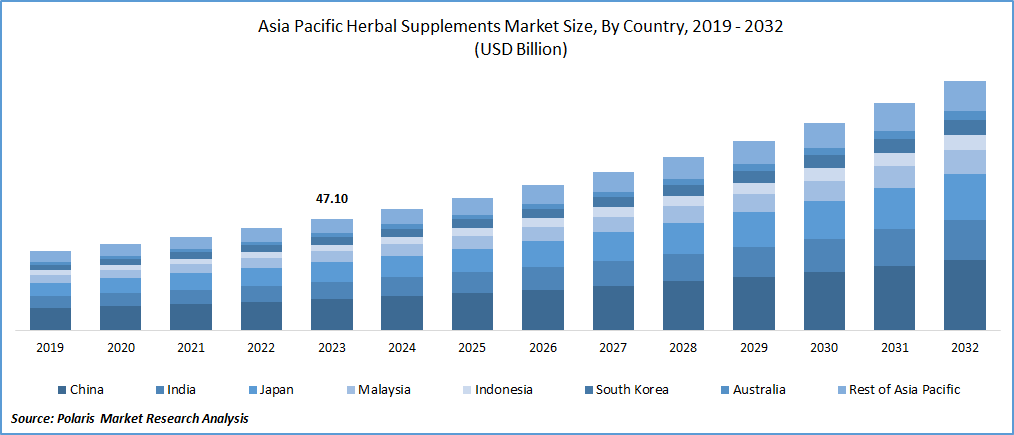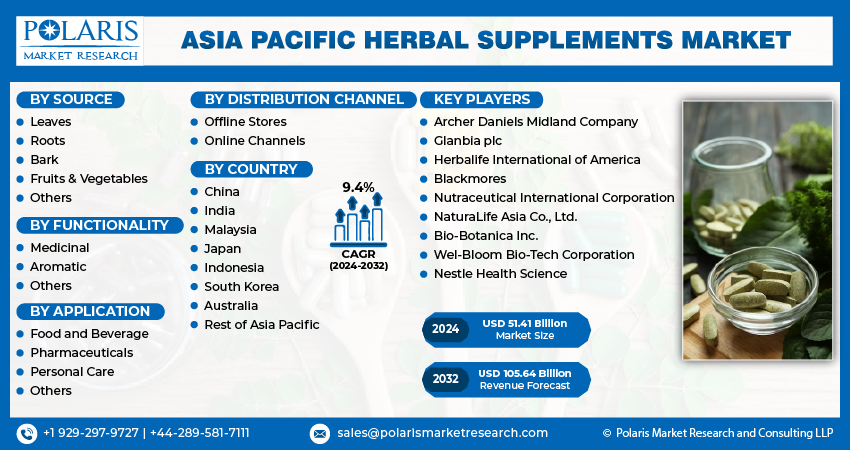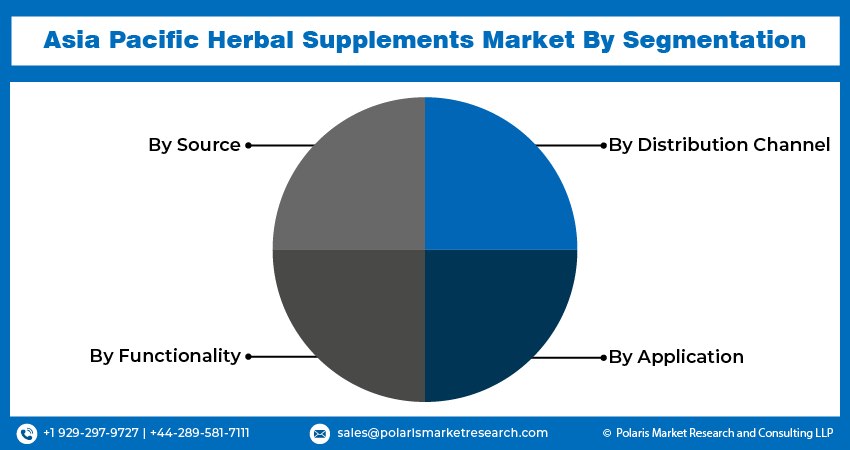
Asia Pacific Herbal Supplements Market Share, Size, Trends, & Industry Analysis Report
By Source (Leaves, Roots, Bark, Fruits & Vegetables, Others); By Functionality; By Application; By Distribution Channel; By Country; Segment Forecast, 2024 - 2032
- Published Date:Feb-2024
- Pages: 119
- Format: PDF
- Report ID: PM4251
- Base Year: 2023
- Historical Data: 2019-2022
Report Outlook
The Asia Pacific herbal supplements market was valued at USD 47.10 Billion in 2023 and is expected to grow at a CAGR of 9.4% during the forecast period.
The market is a rapidly growing industry driven by increasing consumer awareness and demand for natural health products. The region's diverse cultural and traditional medicine practices have contributed to a rich variety of herbs and plants being used for medicinal purposes. This has led to a surge in the popularity of herbal supplements, which are seen as a safer and more natural alternative to synthetic drugs.
The market is driven by the increasing health consciousness among consumers, rising disposable income, and growing interest in preventive healthcare. Consumers are becoming more aware of the potential side effects of synthetic drugs and are turning to natural alternatives like herbal supplements to address various health concerns. Also, governments in the region are promoting traditional medicine and herbal supplements through initiatives such as subsidies for farmers cultivating medicinal plants and support for research and development of herbal products.

To Understand More About this Research: Request a Free Sample Report
However, challenges facing the market include concerns about product safety and efficacy, the need for more standardization, and intense competition from conventional pharmaceutical companies. Ensuring the quality and safety of herbal supplements requires strict regulations and guidelines, which can be difficult to enforce in some countries. Despite these challenges, the market is poised for continued growth, driven by increasing consumer demand for natural health solutions.
Growth Drivers
Growing Emphasis on Traditional Medicine Practices Drives Market Growth
The growing emphasis on traditional medicine practices has significantly contributed to the expansion of the Asia Pacific herbal supplements market. In recent years, there has been a renewed interest in ancient healing methods, such as Traditional Chinese Medicine (TCM) and Ayurveda, which place great importance on the use of herbs and natural remedies for preventive care and treatment. This shift towards traditional medicine practices has led to an increased demand for herbal supplements as consumers seek out natural alternatives to synthetic drugs.
Also, governments in countries like China and India have implemented policies that support the development and promotion of traditional medicine, including investing in research and development, establishing standards for product quality, and providing education and training programs for practitioners. As a result, the Asia Pacific herbal supplements market is expected to continue its upward trend.

Report Segmentation
The market is primarily segmented based on source, functionality, application, distribution channel, and country.
|
By Source |
By Functionality |
By Application |
By Distribution Channel |
By Country |
|
|
|
|
|
To Understand the Scope of this Report: Speak to Analyst
By Functionality Analysis
The Medicinal Segment Dominated the Market in Terms of Revenue Share in 2023
The medicinal segment accounted for the largest revenue share in 2023, owing to the increasing demand for natural and traditional remedies in the region, particularly in countries such as China, India, and Japan. Herbal supplements are widely used in these countries as an alternative therapy to conventional medicine, especially for chronic diseases such as diabetes, cardiovascular disease, and arthritis.
Also, many Asian cultures have a long history of using herbs and plants for medicinal purposes, which has contributed to the popularity of herbal supplements in the region. The growing awareness about the side effects of synthetic drugs and the safety concerns associated with them have led consumers to opt for natural alternatives like herbal supplements. This shift in consumer preference has driven the growth of the medicinal segment in the Asia Pacific herbal supplements market.
By Application Analysis
The Pharmaceuticals Segment Dominated the Market in 2023
The pharmaceuticals segment dominated the market in 2023, accounting for a significant share of the total revenue due to the increasing demand for traditional herbal medicine and growing focus on the benefits of natural supplements in countries such as China and India. In addition, the presence of a large number of pharmaceutical companies in the region, connected with their extensive distribution networks and strong marketing strategies, has contributed to the growth of this segment. The availability of a wide range of herbal supplements in various forms, such as capsules, tablets, and powders, has made them more accessible to consumers, thereby driving the growth of the pharmaceuticals segment in the Asia Pacific herbal supplements market.

Country Insights
China Accounted For the Largest Market Share in 2023
China has a long history of traditional medicine practices, such as Traditional Chinese Medicine (TCM), which emphasizes the use of herbs and plants for health and wellness. This has led to a strong demand for herbal supplements in the country, driving growth in the market. In addition, China is home to a large number of elderly population, who are more likely to consume herbal supplements as part of their healthcare routine. The government's support for traditional medicine and herbal supplements through policies and regulations has also boosted the market. The country's dynamic agricultural land and diverse climate also enable the cultivation of a wide variety of medicinal herbs, making China a leading producer of herbal supplements. As a result of these factors, in 2023, China dominated the Asia Pacific region in the context of the herbal supplements market.
Key Market Players & Competitive Insights
In the Asia Pacific region, manufacturers are actively engaged in the production and distribution of herbal supplements. They are constantly researching and developing new products to meet the growing demand for natural health remedies. Manufacturers are also focusing on improving the quality control process to ensure the safety and efficacy of their products. In addition, they are expanding their product portfolios by introducing new variants of existing products or acquiring other brands to cater to different consumer segments. Furthermore, many companies are using e-commerce platforms to sell their products directly to consumers, which has become increasingly popular due to the COVID-19 pandemic.
Some of the major players operating in the Asia Pacific market include
- Archer Daniels Midland Company
- Glanbia plc
- Herbalife International of America
- Blackmores
- Nutraceutical International Corporation
- NaturaLife Asia Co., Ltd.
- Bio-Botanica Inc.
- Wel-Bloom Bio-Tech Corporation
- Nestle Health Science
Recent Developments
- In 2022, Herbalife launched a range of meal replacement products that are nutrient-rich and convenient to consume. The range includes shakes, baked pastries, and snacks.
- In August 2021, Nestlé Health Science has recently completed the acquisition of the core brands of the Bountiful company, which supplies vitamins, minerals, and herbal supplements. The acquisition is intended to expand Nestlé Health Science's health and nutrition portfolio by adding new brands and sales channels.
Asia Pacific Herbal Supplements Market Report Scope
|
Report Attributes |
Details |
|
Market size value in 2024 |
USD 51.41 Billion |
|
Revenue Forecast in 2032 |
USD 105.64 Billion |
|
CAGR |
9.4% from 2024 – 2032 |
|
Base year |
2023 |
|
Historical data |
2019 – 2022 |
|
Forecast period |
2024 – 2032 |
|
Quantitative units |
Revenue in USD Billion and CAGR from 2024 to 2032 |
|
Segments Covered |
By Source, By Functionality, By Application, By Distribution Channel, By Country |
|
Country scope |
China, India, Malaysia, Japan, Indonesia, South Korea, Australia, Rest of Asia Pacific |
|
Customization |
Report customization as per your requirements concerning countries, regions, and segmentation. |
FAQ's
Source, functionality, application, distribution channel, and country are the key segments in the Asia Pacific Herbal Supplements Market.
The Asia Pacific herbal supplements market size is expected to reach USD 105.64 Billion by 2032.
The Asia Pacific herbal supplements market is expected to grow at a CAGR of 9.4% during the forecast period.
China regions is leading the global market.
Growing emphasis on traditional medicine practices drives market growth are the key driving factors in Asia Pacific Herbal Supplements Market.
